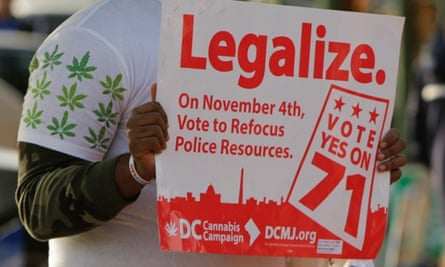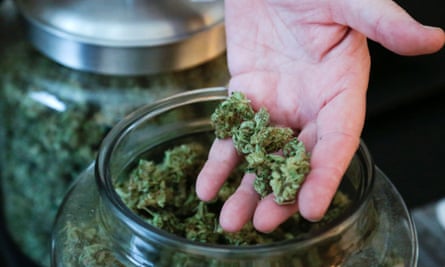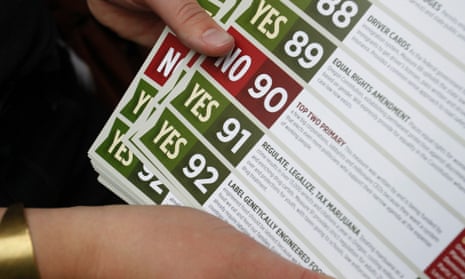Oregon and Alaska have become the latest US states to legalise recreational marijuana in ballots hailed by supporters as evidence that a national change of policy is underway.
Voters in both states approved laws which will permit residents over 21 to grow their own marijuana and establish a legal retail trade.
Anthony Johnson, the chief sponsor of Oregon’s Measure 91, compared the victory for the legal sale and use of cannabis to the recent end of the state’s ban on gay marriage, saying that voters had struck a blow for freedom and equality.
“We have ended a painful, discriminatory, harmful policy,” he said.
In Oregon, with 87% of the ballot counted, support for Measure 91 had a decisive lead with 54.8% of votes. In Alaska, the pro-legalisation campaign had 52% of the vote with all precincts reporting but absentee ballots still to be counted.
There were victories for more liberal marijuana laws elsewhere too. In Washington DC, voters approved possession of small amounts of cannabis for personal use – although that move could be blocked by the US Congress, which holds significant legislative authority over the city.

The Pacific island of Guam became the first US territory to legalise medical marijuana, but a vote on the same issue in Florida fell just short of the 60% threshold that was required for it to pass.
The results in Oregon and Alaska, which followed the legalisation of recreational marijuana in neighbouring Washington state and Colorado two years ago, were cheered by national campaigns as evidence of a gathering movement to challenge federal laws banning the drug.
Earl Blumenauer, a member of the US Congress whose district includes part of Portland, told a victory party that the momentum from Oregon would spread across the country.
“You are going to change national policy,” he said. “The marijuana legalisation train has left the station.”
Measure 91 had significant political backing from other politicians, including from Oregon senator, Jeff Merkley, the first US senator to come out publicly in support of legalisation.
Funding for the campaign, at about $7.5m, heavily outweighed money to the opposition, which raised less than $180,000. One of the major supporters was billionaire George Soros’s Drug Policy Alliance, which spent nearly $800,000 to promote the vote in favour.
Jill Harris, the alliance’s director of strategic initiatives and point person on Measure 91, said the Oregon vote was further evidence of a growing national support “for rescinding prohibition of marijuana and for drug policy reform in general”.
“It’s pretty clear the American people support marijuana legalisation by decent margins and there’s been a shift toward reform toward less punitive more health based attitudes to drugs in general and certainly with respect to marijuana,” she said.
Harris said that for the measure to pass in a non-presidential election year, when the turnout of younger voters is lower, indicates that initiatives to legalise marijuana in other states in 2016 should do well.
“Looking ahead where there’s going to be legalisation measures on the ballot in places like California, Massachusetts, and potentially Nevada, Arizona and Maine, I think we’ll be looking at a presidential year electorate and those initiatives will do very well. This result is just building momentum toward that,” she said.
Legalisation in Oregon, which will come into force in July 2015, goes further than in neighbouring Washington state by permitting users over the age of 21 to grow their own cannabis and keep up to four mature marijuana plants. Oregonians will also be able to possess much larger quantities than in Washington state or Colorado, which permit up to one ounce of cannabis. Oregon will allow eight ounces.
Alaska will permit residents to grow up to six cannabis plants and allow them to carry up to one ounce.
Oregon was the first state to decriminalise possession of small amounts of marijuana in 1973 and legalised medical marijuana 25 years later. But two years ago voters spurned a chance to legalise recreational use when confronted with what was widely criticised as a poorly written and overly broad law. This year, campaigners proposed a ballot measure that required much tighter regulation and put oversight in the hands of the Oregon liquor control commission.
Alaska’s supreme court ruled in 1975 that the state constitution’s privacy protections allowed people to possess and use small amounts of cannabis in their homes but the question of how they could obtain the drug was not resolved. Campaigners for the new law said it removed the issue.

Supporters of legalisation promoted it as a means of combating drug cartels and relieve the police of time-wasting arrests for possession of small amounts of the drug. They also say it will generate much-needed tax revenues to be divided between schools, law enforcement and mental health and addiction treatment programmes.
But it has met with resistance in some parts of Oregon over fears of drug tourism. Several town councils have passed additional tax levies on marijuana to discourage its sale in their municipalities. However, the ballot measure would appear to override the ability of local authorities to tax cannabis by giving that power solely to the state.
Opponents raised a number of issues, from the “normalisation” of the drug encouraging its use by young people to questions about how the police would be able to determine if a person was driving while stoned.
Among the most vocal opponents of Measure 91 was the Clatsop county district attorney, Josh Marquis, who has described the amount of marijuana individuals will be allowed to possess as “staggering”. He said some of it would inevitably end up being sold or given to underage users because there is no way to control its distribution.
Other critics of the form of the legislation, if not its intent, warn that it could have unintended consequences if it is not amended by the state legislature.
Mark Kleiman, a UCLA professor and chief consultant to Washington state on its marijuana laws, said that Measure 91 has set the tax rate too low at $35 an ounce, which would result in the drug being underpriced and increase use by minors and people with a chronic use problem.







Comments (…)
Sign in or create your Guardian account to join the discussion